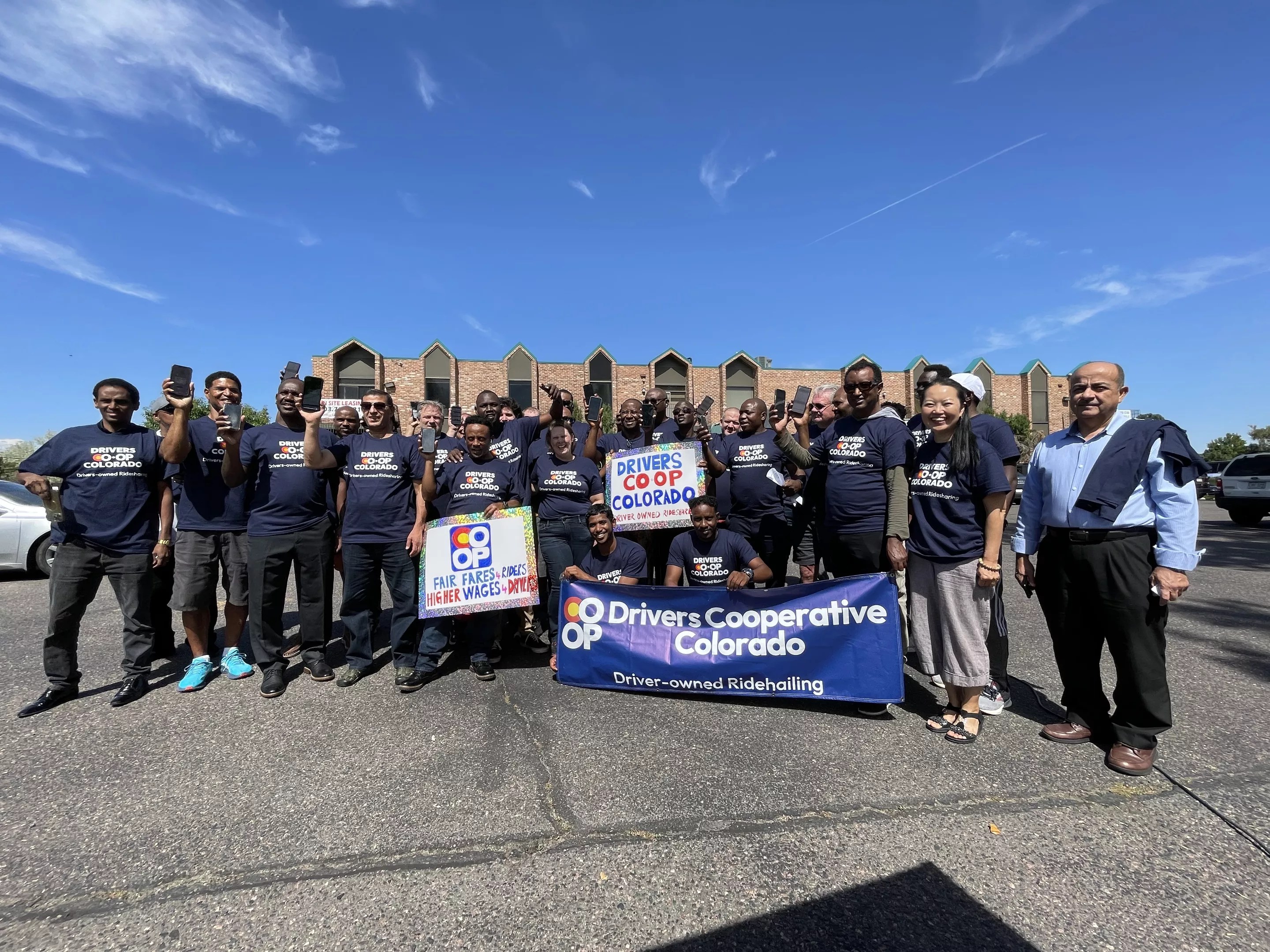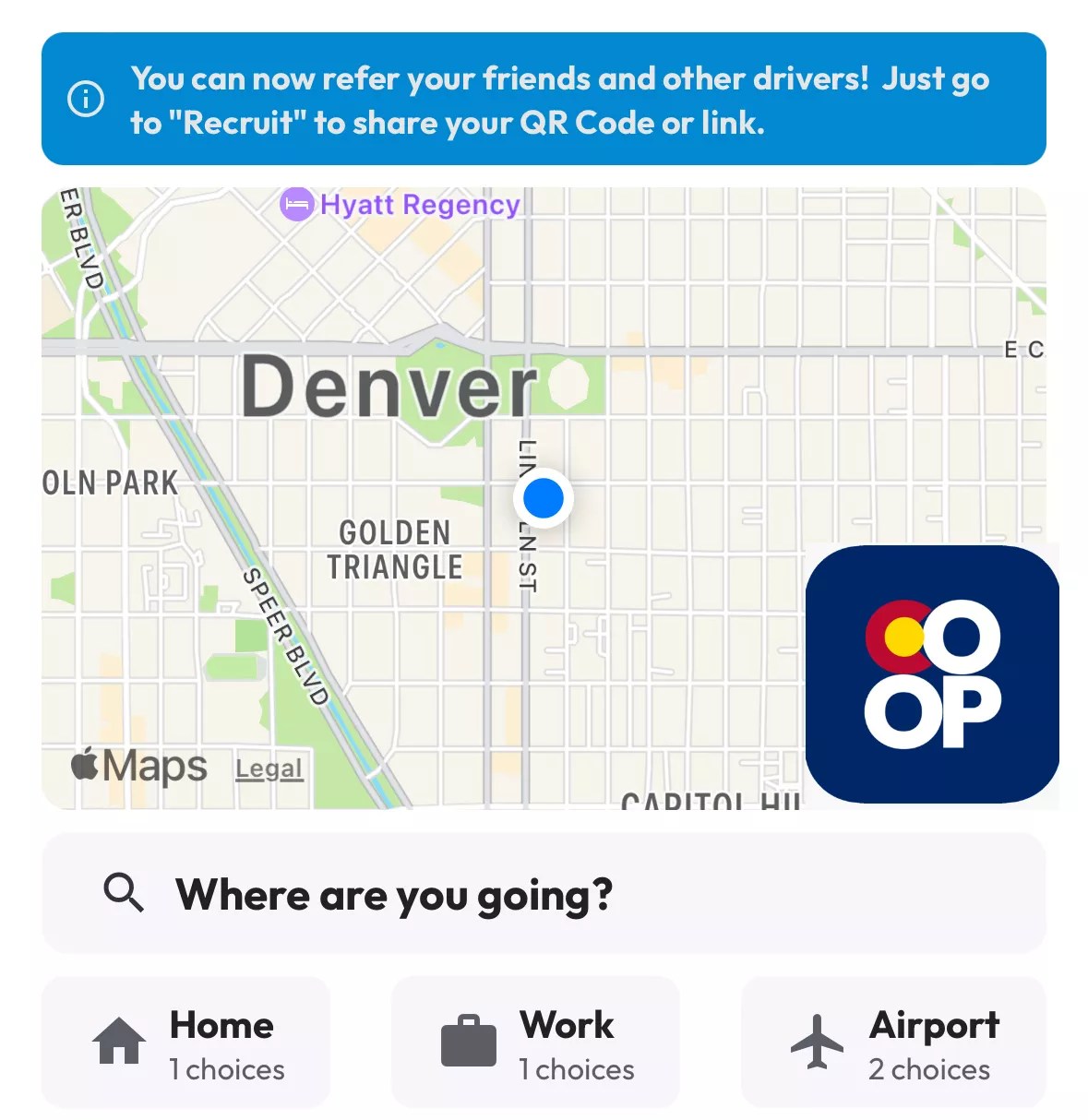
Courtesy Co-op Colorado

Audio By Carbonatix
Co-Op Colorado, the employee-owned app designed to compete with Uber and Lyft on a local level, is now active in Denver.
Since 2023, the Rocky Mountain Employee Ownership Center has worked with drivers and state regulators to get the app up and running. The app was created for gig drivers to achieve fairer working conditions and wages than Uber and Lyft currently offer, according to drivers.
On August 29, the app went live.
“Drivers are extremely happy,” says Minsun Ji, executive director of the RMEOC. “This is the dream come true. They are happy because it’s all transparent. If you click a ride, it shows exactly how much customers pay and how much you are taking.”
Drivers have lamented the diminishing “take rate” from Uber and Lyft rides even as trips have gotten more expensive for customers. When the cross-institutional Workers’ Algorithm Observatory examined data from over 13,000 gig drivers in Colorado, the academic organization found that only about 14 percent of what customers pay goes to drivers. The Observatory also discovered that base pay for Colorado drivers decreased from about $1.50 per mile in 2019 to around 50 cents per mile by 2024.
Co-Op Colorado plans to raise pay and transparency for drivers. The organization takes a 20 percent rate on all trips to maintain costs like business licensing, insurance and app development, with drivers retaining the other 80 percent of revenue.
Next steps for new app
Co-Op Colorado drivers are aware that it won’t be competitive for on-the-fly rides at the moment, but Ji expects it will become competitive within one year of doing business.
“The workers, drivers, they’re so super excited,” she says. “Drivers are also onboarding really quickly.”
Ji projects the app will reach 1,000 drivers over the next few months and 2,500 drivers by next September, which she believes will disrupt the rideshare market currently dominated by Uber and Lyft. For now, the co-op is focusing on providing as many rides as possible and forming partnerships with entities that serve people who need rides to gain a financial cushion.
Co-Op Colorado is already working with the nonprofit Remerg, which helps people recently released from incarceration access resources needed to stay out of jail or prison. Drivers from the co-op will help give rides to people who may have lost their licenses or lack a vehicle. According to Ji, there are already six clients from Remerg assigned to drivers.
The co-op hopes to work with other organizations to serve people with disabilities who can’t drive, or refugees and immigrants who don’t have licenses yet. Over 70 percent of Co-Op Colorado members are immigrants themselves, Ji adds.
“This is the very first on-demand app that has been developed by community groups right here in Colorado,” she says. “This can go big. We can actually share this app with so many other cities’ drivers. That’s our ultimate goal: to share this resource with others.”
Denver is the second city to launch a driver-owned app; a drivers’ co-op launched in New York City in 2021. In New York, the co-op started with pre-planned trips only, contracting with the MTA’s Access-a-Ride program to help drive people to non-emergency medical appointments. The app added on-demand rides in 2023.
To join the Colorado co-op, drivers pay a $100 fee and complete an orientation. People behind Co-Op Colorado helped pass a law giving the Colorado Public Utilities Commission flexibility to lower the annual permitting fee for gig transportation companies.
Because of that change, Co-Op Colorado paid $16,000 for its permit instead of the $111,250 fee all transportation companies had to pay before the passage of the rule. Ji says continued support from the government and the people of Colorado is critical to the next steps for the co-op.
“I’m really hoping people step up and use our app and support us,” she says.
Co-Op Colorado is having a public launch event on September 25 on the west steps of the Colorado Capitol building to help get the word out.
How does Co-Op Colorado compare to Lyft and Uber?
Westword tested out the Co-app to see how it works.
The interface is user-friendly, with a photo and payment method page that pops up automatically upon first use of the app. The Co-Op Colorado app allows users to plug in home and work addresses, and is pre-programmed with the Denver International Airport and Colorado Springs Airport addresses on the home page.

The homescreen of the app plus the app’s logo.
Westword
When I attempted to call an on-demand ride at 9:10 a.m. on a Tuesday from West Hampden Avenue and South Santa Fe Drive to the Westword office at 13th Avenue and Lincoln Street, no one picked up the ride for twenty minutes.
I had a meeting to get to at 10 a.m., so I canceled the ride at 9:30 a.m. My money was immediately refunded, and there was no cancellation fee, though the app noted there could be in the future.
The ride would have cost $17.14 on the Co-Op app. When I called a Lyft instead, it cost $17.69.
Right now, it seems there aren’t quite enough co-op drivers to make on-demand rides reliable unless you’re willing to wait longer. It’s also possible that the length of the trip dissuaded riders from wanting to pick me up.
However, another cross-city trip that I scheduled hours beforehand was accepted almost right away. I needed to get from my Capitol Hill apartment to my cousin’s house in Lakewood by 4 p.m. on a Saturday, so I tested the scheduled-ride function.
Around 11 a.m., I requested the ride for 3:30 p.m. About thirty minutes later, a driver was assigned to pick me up at about 3:20 p.m. The app sent me a notification around 3 p.m. when the driver was on his way, which said he would be arriving in zero minutes, but when I reached out to the driver, he let me know his real ETA.
Though minor bugs in the app popped up, the ride itself was smooth and felt like any other trip with Uber or Lyft. The driver had a Co-Op Colorado sticker on the window, letting me know who he was, and his license plate and car information matched the app’s information.
The trip cost $20.23, not bad for the eleven-mile trip. On my return trip with Lyft at around 7:15 P.M., the ride cost $26.67.
After my ride, I got an emailed receipt that showed exactly how much my driver made ($15.94) and how much the co-op took ($3.99), as well as the trip duration. When I went back into the app and selected the ride, I was able to rate my driver and add a tip.
For those curious about trips to Denver International Airport, a ride from the Westword office to DIA on the app at around 1 p.m. on a Monday was quoted for $54.82. Lyft was quoted at $50.80, and Uber projected a $50.96 cost.
I will definitely be using Co-Op Colorado for any planned trips in the future. The extra information about where my money went was a fun surprise, and it was a smooth process to schedule a ride. But if I need to go somewhere on the fly, I’ll stick with Lyft or Uber for now.
You can download the Co-Op Colorado app for Android devices in the Google Play store and for iPhones in the Apple App Store.